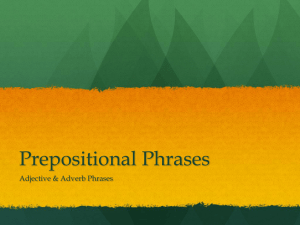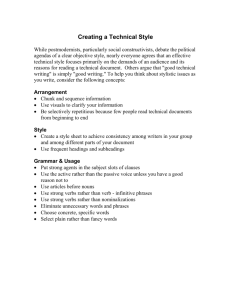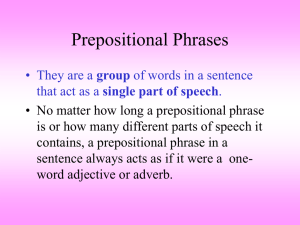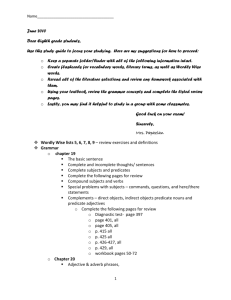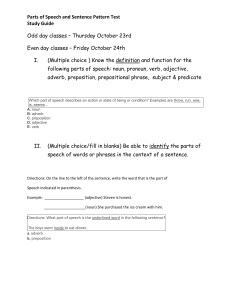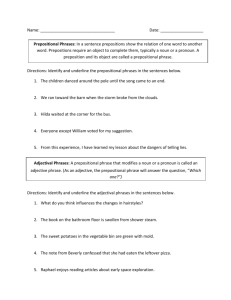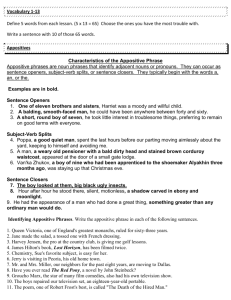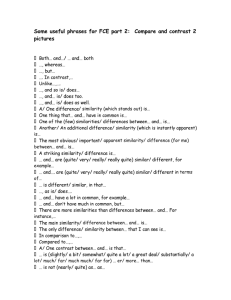Phrases
advertisement
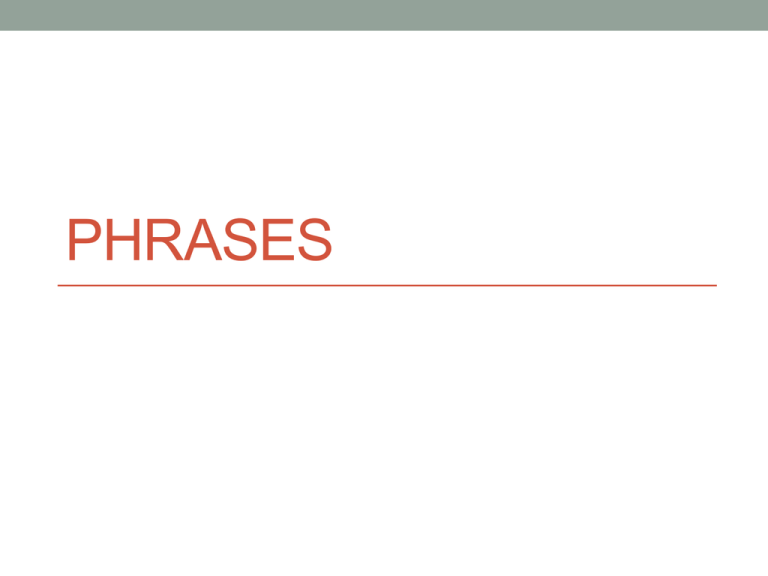
PHRASES Prepositional Phrases Key Concept: • Contains a preposition and a noun or pronoun (the object of the preposition) • Can be an adjective phrase (modifies or describes a noun or pronoun) tells what kind? or which one? • Can be an adverb phrase (modifies or describes a verb, adjective, or adverb) tells when? where? in what way? to what extent? Prepositional Phrases Examples: • The roadway with the two lanes began there. • Bring your saddle to the barn. Practice • WAG Textbook • Exercise 1 Identifying Adjective Phrases • Exercise 2 Identifying Adverb Phrases Exercise 1 Identifying Adjective Phrases Copy the sentences below onto your paper. Then, underline each prepositional phrase used as an adjective, and draw an arrow from it to the word it modifies. 1. Changes in air pressure can cause wind movement. 2. An anemometer measures the speed of the wind. 3. Cups on the anemometer catch the wind. 4. Rushes of air spin the cups. 5. A speedometer on the axle of the anemometer indicates the wind speed. Exercise 2 Identifying Adverb Phrases Each of the sentences below contains at least one prepositional phrase used as an adverb. Copy the sentences onto your paper. Then, underline each adverb phrase, and draw an arrow from it to the word it modifies. 1. Thunderstorms form within large cumulonimbus clouds. 2. Cumulonimbus clouds form when warm air collides with a cold front. 3. Warm, humid air is forced upward into the sky. 4. At the higher altitude, the warm air cools. 5. In a short time, the cooling air creates dense thunderheads. 6. Heavy rain falls and is sometimes accompanied by hail. 7. Inside the clouds, thunderstorms produce strong upward and downward drafts. 8. When a downdraft strikes the ground, the air spreads in all directions. 9. In some instances, the spreading air produces wind bursts called “wind shear.” 10. Wind shear has caused airplane accidents during takeoff and landing. Appositive Phrases Key Concept: • Noun or pronoun and its modifiers that identifies, renames, or explains the word before it. Appositive Phrases Examples: • Willa Carter, an American novelist, wrote My Antonia. • Lisbon, a thriving port in Portugal, has often been the scene of espionage. Practice • WAG Textbook • Exercise 7 Identifying Appositives and Appositive Phrases Exercise 7 Identifying Appositives and Appositive Phrases Underline the appositive or appositive phrase in the sentences below. Then, draw an arrow to the word each one modifies. 1. Kublai Khan, the Mongol emperor of China, sent a fleet of ships carrying a huge army to attack Japan. 2. A typhoon, a powerful Pacific Ocean hurricane, struck the fleet. 3. The ships were buffeted by hurricane-force winds, some measuring more than 119 kilometers per hour. 4. The typhoon actually saved the Japanese from their enemies, the Chinese. 5. The Japanese gave the storm a special name, kamikaze, which means “divine wind.” Practice • WAG Workbook Prepositional Phrases • Pg. 69 Exercise 1 • Pg. 70 Exercise 1 • Pg. 71 Exercise 1 • Pg. 72 Exercise 1 Appositive Phrases • Pg. 73 Exercises 1 & 2 • Pg. 74 Exercise 1 Participial Phrases • Key Concept: • A participle is a form of a verb that is used an adjective. A participial phrase includes the participle and its modifiers. • Participles can be present or past: • Present participles end in –ing • Past participles can end in –ed –d –n –t –en Participles & Participial Phrases Examples: • A walking tour was arranged. • The cooked food won’t spoil. • The instructor, speaking slowly, explained the use of skis. • Honored by the award, the esteemed poet expressed his thanks. Practice • WAG Textbook • Exercise 4 Recognizing Participial Phrases Exercise 4 Recognizing Participial Phrases Copy the sentences below onto your paper. Then, underline each participial phrase and draw an arrow pointing from it to the word it modifies 1. Known for its cold weather, Minnesota has an abundance of snow. 2. Gripping the shovel, I went to work. 3. The driveway, covered in ice, seemed huge. 4. Finishing up, we went inside to warm our hands. Practice • WAG Workbook Participles & Participial Phrases • Pg. 75 Exercise 1 • Pg. 76 Exercise 1 • Pg. 77 Exercise 1 • Pg. 78 Exercise 1 Infinitives & Infinitive Phrases Key Concept: • An infinitive is a verb form that can be used as a noun, an adjective, or an adverb. The word to usually appears before the infinitive. • An infinitive phrase is an infinitive with modifiers or a complement, all acting together as a single part of speech. Infinitives & Infinitive Phrases Examples: • It is important to listen carefully. • It is not polite to listen through the keyhole. • I want to hear the news. • They want to give you a present. Practice • WAG Textbook • Exercise 5 & 6 Exercise 5 Identifying Infinitive Phrases Copy the infinitive phrase(s) in each of the following sentences onto your paper. 1. 2. 3. 4. 5. 6. 7. 8. 9. 10. We wanted to get home as soon as possible. To drive up the hill was impossible. Our decision, to stop and get a cup of coffee, proved to be the wrong one. The snow seemed to pile up more quickly than before. We had no choice except to drive on. To understand the problem required us to listen. The boys were about to jump when their mother arrived. The soldier tried to follow orders. My dream, to fly an airplane, was finally coming true. No one seemed to know he was there. Exercise 6 Writing Sentences With Infinitive Phrases Write sentences using each of the following infinitive phrases. 1. 2. 3. 4. 5. 6. 7. 8. 9. 10. to become a doctor to travel to Russia to roast the chestnuts to study harder to wait until summer to bake a cake to see them again to go camping to learn about art to visit grandmother’s house
